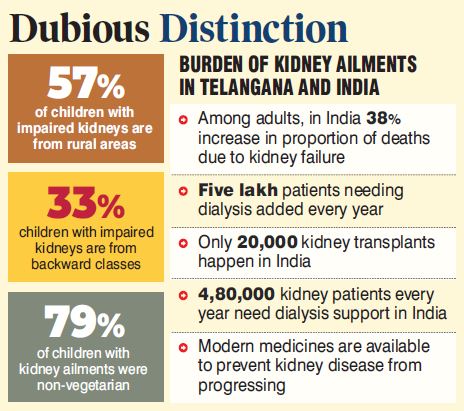Impaired Kidney Function high among children, adolescents in Telangana
A study reveals that 20% of children and adolescents aged 5 to 19 years in Telangana suffer from Impaired Kidney Function (IKF), a condition affecting the kidneys' ability to filter waste
Published Date - 16 October 2024, 10:57 PM
Hyderabad: Telangana State has attained the dubious distinction of having the largest number of children and adolescents in the country with Impaired Kidney Function (IKF), a study by nephrologists published in the prestigious open access journal BMC Pediatrics (July 2024), said. Such a heavy burden of children with kidney disease is a major public health concern that requires closer attention from the State government.
The prevalence of IKF, a medical condition in which the kidneys do not properly filter waste and other body fluids among children and adolescents, is 20 per cent in Telangana and 29 per cent in Andhra Pradesh, the study said. It also pointed out that the 20 per cent prevalence could be an underestimation and the number of children and adolescents with IKF could be higher. “Data collected is of children with kidney ailments who are undergoing treatment,” it said.
The true prevalence of IKF in Telangana, which has several hotspots for kidney ailments, will hover between 20 percent and 30 percent among children and adolescents aged from 4 years to 19 years.
As a part of the study, serum creatinine was tested once in 24,690 children and adolescents aged 5 years and 19 years across different States. The estimated glomerular filtration rate (eGFR), which is an indication of kidney function, was calculated. The prevalence of IKF in Telangana was 20 per cent and was far greater than the overall prevalence of the ailment among children.
Q&A
‘Challenge is to identify patients at an early stage’
Around five lakh new kidney patients requiring dialysis are added every year in India and the number of kidney transplants performed per year is just 20,000, says Dr Rajasekara Chakravarthi Madarasu, Clinical Director and Head, Nephrology and Transplant Services, Yashoda Hospitals, Hitec City. “This means remaining 4,80,000 chronic kidney patients require dialysis support all through their lives,” he points out.
• How to handle the huge disease burden?
It is not practical for any country in the world to provide dialysis support for such a large number of patients. The only way is to ensure early diagnosis and ensuring that stage-I and stage-II kidney patients do not progress to stage-IV or stage V, where dialysis support and kidney transplantation is required.
• Can kidney disease be stopped from progressing?
Yes! New research and modern medicines can stop kidney disease from progressing. However, till a few years ago, nephrologists did not have such tools to assure patients. Now, the challenge is to ensure that kidney patients are identified at a very early stage, preferably stage-I or II, which is not happening.
• Six major risk factors for kidney ailments?
Diabetes, hypertension, kidney stone disease, frequent urine infection, obesity and family history are the most important risk factors. People who frequently take antibiotics, antacids and those who do not hydrate properly are also at risk.
• What individuals should do for early detection?
I suggest everybody to undergo typical kidney tests at least once every six months. The standard eGFR test and urine protein creatinine tests will be enough. This can identify any kidney disease in early stage and stopping its progression is possible. Prevention should only be the focus now.
